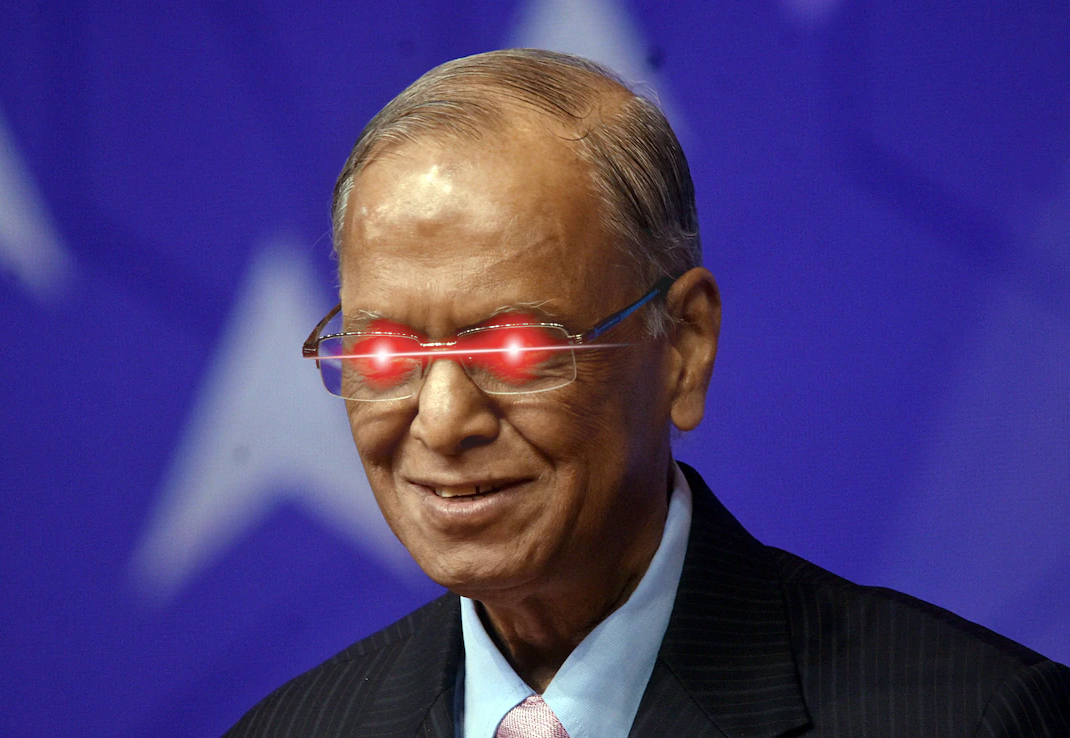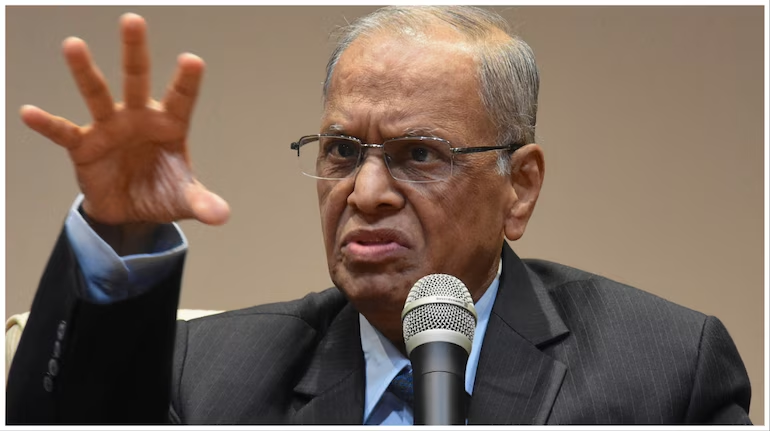Addressing the Indian Chamber of Commerce centenary launch, Murthy drew a grim picture of the nation, lamenting that 800 million Indians receive free rations and live in poverty. His solution? Forget systemic reform, just work harder! After all, if India’s youth don’t put in 70-hour weeks, who will? Someone has to keep bringing those 7 figure dividends to his grandson.
Murthy insists that “performance leads to recognition, recognition leads to respect, and respect leads to power.” But for the youth expected to sacrifice their well-being for his vision, it might feel more like exhaustion leads to burnout, burnout leads to resignation, and resignation leads to apathy. So, dear Indians, take note: if you’re not working 70 hours a week, you’re not just failing Murthy’s lofty ideals—you’re also failing India. Never mind the billionaires resting comfortably atop the wealth pyramid; the burden of national progress rests squarely on your overworked shoulders.

How Long Do We Have To Suffer Through These Enlightened Outbursts from Murthy?
In his latest crusade to transform India through sheer exhaustion, Infosys co-founder Narayana Murthy is once again extolling the virtues of a 70-hour workweek. Speaking in Kolkata, which he lovingly dubbed “the most cultured place in the entire country” (a surefire way to charm any local audience), Murthy urged the nation’s youth to toil endlessly to make India “number one.” Because, obviously, the road to national glory is paved with burnout and unpaid overtime. Murthy’s constant grandstanding is, however in direct contradiction to the fact that his toddler of a grandchild is set to earn ₹4.2 crore a year from Infosys dividend. But you, the peasantry of India should embrace hard work—because, clearly, their current efforts aren’t enough to impress him.
Murthy further masticated on about his days as a Leftist during Jawaharlal Nehru’s era—before apparently pivoting to capitalism on steroids—Murthy showered praise on Kolkata’s cultural icons like Rabindranath Tagore and Satyajit Ray. One wonders if he paused to reflect on whether Tagore would’ve endorsed the idea of 70-hour workweeks or preferred, say, a more humane approach to progress. Murthy shared his transformation from a Nehru-era Leftist to a devout capitalist. Inspired by his time in 1970s Paris—where he discovered that trains ran on time and pothole-free roads existed—he decided socialism wasn’t for him. A brief chat with the French Communist Party leader apparently sealed the deal. Realising that governments have “absolutely no role in entrepreneurship,” Murthy returned to India with a vision of “compassionate capitalism”—an intriguing concept that somehow involves long hours and minimal comfort for workers.

The geriatric oligarch, now a staunch advocate of what he calls “compassionate capitalism,” spoke of combining capitalism with the “best aspects of liberalism and socialism.” However, this compassion apparently doesn’t extend to the tired, underpaid workforce he’s rallying to sacrifice their lives at the altar of GDP growth. In true billionaire fashion, Murthy sees entrepreneurship as the nation’s saviour. He waxed poetic about how job creation, wealth generation, and tax contributions would miraculously transform India into a paradise of good roads, functional infrastructure, and global respect. Left unaddressed? The pesky details, like wage inequality or the impact of overworking a population already grappling with stress and burnout.

The nostalgia continued as Murthy showered praise on Kolkata’s cultural heritage, invoking names like Tagore and Satyajit Ray. Would these icons of Indian thought and creativity have endorsed 70-hour workweeks? Unlikely, but that didn’t stop Murthy from name-dropping them. Doubling down on his argument, Murthy shared an anecdote about a mysterious gentleman who claimed Chinese workers are 3.5 times more productive than Indians. His takeaway? Indians should stop “writing nonsense” and dedicate themselves to nonstop labor to escape their “wretched, filthy, and poor” state. Because, naturally, shaming an entire workforce is the key to boosting morale.
Taking a swipe at Indian productivity, he cited an anonymous gentleman who claimed Chinese workers are 3.5 times more productive than Indians. His solution? Less “writing nonsense” and more relentless slogging to escape the depths of wretchedness and filth he so poetically described. Because nothing inspires pride in one’s nation like a billionaire publicly trashing it. Murthy’s grand vision is clear: if the youth of India would only abandon their comfort, shun work-life balance, and dedicate themselves to becoming human cogs in the productivity machine, the nation might just claw its way to global relevance. For those daring to dream of eight-hour workdays, better wages, or even a weekend, the message is simple: keep dreaming.
The views expressed in this article are personal. They do not reflect the opinions, beliefs, or positions of Vygr and Vygr Media Private Limited.
© Copyright 2024. All Rights Reserved Powered by Vygr Media.


























